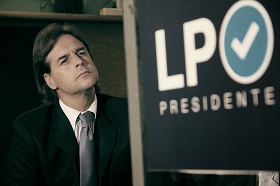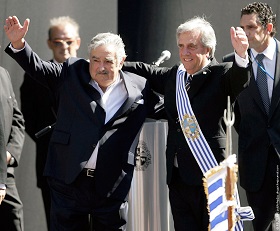The Uruguayan presidential elections took place on October 26, 2014. Their results — 44 per cent for the pre-election favourite Tabaré Vázquez against 34 per cent for his rival Luis Alberto Lacalle Pou — mean that the people will have to make their final choice in the second round to be held on November 30.
The Uruguayan presidential elections took place on October 26, 2014. Their results — 44 per cent for the pre-election favourite Tabaré Vázquez against 34 per cent for his rival Luis Alberto Lacalle Pou — mean that the people will have to make their final choice in the second round to be held on November 30.
The Main Players
— Seventy-four-year-old oncologist Tabaré Vázquez, who represents Frente Amplio (“Broad Front”), the leading coalition of left-wing parties and the progressive members of traditional parties. Voters are used to seeing Vázquez, who served as the country’s president from 2005 to 2010 and remains one of Latin America’s most popular politicians. If he wins, he will become the first Uruguayan socialist president to conquer the two-party system that has been in place for more than 150 years.
— Forty-one-year-old lawyer and Member of Congress Luis Lacalle Pou, leader of the Partido Nacional (National Party). Evidently, Lacalle Pou inherited his interest in politics from his father, who was President of Uruguay from 1990–1995 and is still well-respected in the country for his economic reforms.
— Current President of Uruguay José “Pepe” Mujica Cordano, who has publically declared his support for Vázquez. His presidential mandate is to expire in a few months, but he remains an extremely popular leader. The Uruguayan people praise his modest lifestyle, which is almost unheard among Latin American politicians; he gives the majority of his salary to charity, supporting housing projects for the working class.
Uruguay in the Run-Up to the Elections
When he took leadership of the Broad Front party in 2005, Tabaré Vázquez pursued a policy that combined pro-market measures and social support programmes. The result was a significant drop in poverty level in the country. This in many ways laid the foundations for the current model of socio-political development that was continued by José Mujica when he replaced Vásquez as the head of government in 2010.
Having been named “country of the year” by The Economist [1], Uruguay came ahead of all Latin American countries in the World Bank’s Gini Index, which ranks the level of a country’s income stratification, obviously, thanks not only to the personal example of the national leader, but also to the economic policy pursued by his government.
In a climate that is favourable for direct foreign investments, Uruguay’s economy has shown annual growth of an average of 5.4 per cent in recent years [2]. When Broad Front came to power in 2005, the level of poverty in the country stood at 40 per cent. To date, this figure has dropped to 12 per cent. According to official data, the distribution of wealth under the socialist government is fairer than it has been at any time over the past 30 years.
In addition to his economic successes, José Mujica will be remembered for his progressive social reforms, which have not garnered the support of all potential voters. The policies in question are the legalization of abortions, same-sex marriages and marijuana. There is also a broad consensus in the country with regard to state support for education, infrastructure projects and public safety.
Presidential Promises
On November 30, 2014, the Uruguayan people will decide on a new model of development for an economy whose growth has started to slow down. The model used by José Mujica’s government combined orthodox macroeconomic management with government intervention when it came to allocating resources. If Tabaré Vázquez is elected president, it does not necessarily mean that he will continue this course. The alternative model, put forward by the National Party, advocates the need to reduce the role of the state, create an investment climate that would lead to economic growth and open up the economy by expanding trade.
As for the standard pre-election promises, Broad Front’s candidate has committed himself to continuing to improve the quality of life of every single Uruguayan citizen by making changes to the healthcare model and increasing spending on education. In contrast to his more mature opponent, Lacalle Pou has turned to the slogan “Action, Not Reaction,” emphasizing the need to reform the system rather than maintain the status quo. His main priorities are education, national security and the development of infrastructure. Members of the National Party have already stated that they are willing to continue the current government’s reforms, but only on the basis of their own priorities and ideologies.
One of the most discussed issues during the election campaign has been the question of what will happen to the liberal reforms carried out by José Mujica’s government. In particular, many observers have predicted a serious change in the vector of the country’s social policy should the National Party emerge victorious. As Lacalle Pou’s main demographic is the conservative middle class, this would probably entail cancelling the bill on the legalization of marijuana and giving the state the power to control its sale and production.
For his part, Vázquez is clearly not planning to blindly follow the path of the outgoing cabinet should he be elected president. His policies also diverge when it comes to social policy. During the election campaign, he made it clear that he would look at restricting the scope of the law on marijuana. The socialist candidate has also shown that he does not agree with the bill to legalize abortions during the early stages of pregnancy, reminding voters that he vetoed an initiative to introduce such a bill back in 2008.
***
On November 30, 2014, the people of Uruguay have to decide whether they want to continue to support the policies of the Broad Front party, or give more conservative approaches a try. The objective need to reinvigorate political life in the country may work against the ruling party – after all, its representatives have been at the helm for two consecutive terms, and (it must be said) they have achieved a lot. In this sense, choosing Lacalle Pou, who has positioned himself as a politician of the new generation, may very well be justified. It looks like the Uruguayan people have some serious thinking to do – experience and maturity are once again being challenged by youth and an alternative vision of the future.
1. Earth’s Got Talent. The Economist. 23.11.2013. http://www.economist.com/news/leaders/21591872-resilient-ireland-booming-south-sudan-tumultuous-turkey-our-country-year-earths-got
2. Supplementary Analysis: Oriental Republic of Uruguay http://deuda.mef.gub.uy/documents/15486/39660/S%26P+-+August+2014+-++RatingsDirect_Analysis.pdf?version=1.0






